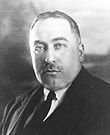 |
Català
| Castellano
| English
| Français
| Deutsch
| Italiano
| Galego
| Esperanto
En aquest lloc «web» trobareu propostes per fer front
a problemes econòmics que esdevenen en tots els estats del món:
manca d'informació sobre el mercat, suborns, corrupció,
misèria, carències pressupostàries, abús de
poder, etc.
|
 |
|
Foreword second edition.
The clairvoyance, the rigour, the structure, the two or three brilliant intuitions, and the hundreds of resourceful solutions and suggestions added to them, as the bodywork to a Mercedes motor, all his life (over three quarters of a century) dedicated to give shape to a general economic, social and political system, in the field of phenomena, and an unshakable faith in the field of transcendence: this is the work of Agustí Chalaux. The loving, capable, orderly, exact editing task of this work, belongs to Magda Grau. I met her when she was still a child among other children, in a meeting at the Helping Capuchins, in the Ciutat Vella district of Barcelona. Every week those teenagers met freely to listen awkwardly to the teacher's living voice, that of Agustí Chalaux. She persevered. She studied economics. And shaped as a book, this book, what Agustí explained, that others of us listened to and tried to put down in more imperfect editions. In these brief first lines I cannot resist the temptation to put on paper the three fundamental (in my opinion) intuitions of Finaly-Chalaux:
Let us meditate on this! Lluís Maria Xirinacs. |
 The
inspiration, the encouragement, the spirit was Horace Finaly, a Hungarian
Jew émigré to France, who became the president of the Banque
de Paris et des Pays Bas, a great financier, scholar, humanist, philosopher,
reader of the Greek classics in their original language, a repository of
old and wise Platonic traditions. He gives the name to the School which
publishes this book.
The
inspiration, the encouragement, the spirit was Horace Finaly, a Hungarian
Jew émigré to France, who became the president of the Banque
de Paris et des Pays Bas, a great financier, scholar, humanist, philosopher,
reader of the Greek classics in their original language, a repository of
old and wise Platonic traditions. He gives the name to the School which
publishes this book.